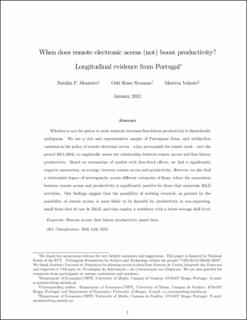When does remote electronic access (not) boost productivity? Longitudinal evidence from Portugal
Journal article, Peer reviewed
Accepted version
Permanent lenke
https://hdl.handle.net/11250/2990987Utgivelsesdato
2021Metadata
Vis full innførselSamlinger
- Department of Economics [287]
- Registrations from Cristin [9489]
Originalversjon
Information Economics and Policy. 2021, 56, 100923. 10.1016/j.infoecopol.2021.100923Sammendrag
Whether or not the option to work remotely increases firm labour productivity is theoretically ambiguous. We use a rich and representative sample of Portuguese firms, and within-firm variation in the policy of remote electronic access – a key prerequisite for remote work – over the period 2011–2016, to empirically assess the relationship between remote access and firm labour productivity. Based on estimations of models with firm-fixed effects, we find a significantly negative association, on average, between remote access and productivity. However, we also find a substantial degree of heterogeneity across different categories of firms, where the association between remote access and productivity is significantly positive for firms that undertake R&D activities. Our findings suggest that the possibility of working remotely, as proxied by the possibility of remote access, is more likely to be harmful for productivity in non-exporting, small firms that do not do R&D, and that employ a workforce with a below-average skill level.

